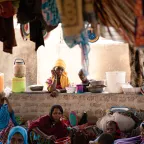Job vacancies in Gaza - ILOT
The International Committee of the Red Cross (ICRC) is an impartial, neutral, and independent organization whose exclusively humanitarian mission is to protect the lives and dignity of victims of …
The International Committee of the Red Cross (ICRC) is an impartial, neutral, and independent organization whose exclusively humanitarian mission is to protect the lives and dignity of victims of …
At the age of 56, Tatyana had to leave her house in Shakhtarsk, in Ukraine's Donetsk region. Fleeing from gunfire and shelling, she went to Krasnodar with her disabled husband. But it's hard to get …

Four months after the floods that hit Myanmar, vulnerable communities are still struggling to recover. The Myanmar Red Cross and the ICRC are helping 25,000 people near Mrauk U in central Rakhine, …

15-10-2020 Geneva (ICRC)—Rising food prices and job losses triggered by the COVID-19 pandemic are raising fears that food insecurity and malnutrition in lower-income communities across Africa are on …

There are many opportunities to meet us and see how your skills, experience and humanitarianism could make you a perfect fit for a career at the ICRC: face-to-face at job fairs, online job fairs, …
… has limited access to essential services, jobs and opportunities outside of the occupied … able to move freely, travel, and have decent jobs,” Nouran Al-Zaeem, 23, told the ICRC. … in Gaza due to: low-income level and lack of jobs, lack of access to basic services, …

… process for headquarters? APPLY TO JOBS RECRUITMENT PROCESS FOR HEADQUARTERS …
… walks on uneven terrain, and does all her jobs with ease. I am thankful for this …

… but nothing worked. Now, I am relying on odd jobs. I have never experienced it before." Her …
… the young Lim Kim Mooi applied for nine jobs, including one to become a police …

Try one of the following resources:
Created in 1863, the ICRC library, alongside the ICRC archives, provides an indispensable documentary reference on the organization itself and international humanitarian law.
International humanitarian law is based on a number of treaties, in particular the Geneva Conventions of 1949 and their Additional Protocols, and a series of other instruments.
Customary international humanitarian law consists of rules that come from "a general practice accepted as law" and that exist independent of treaty law.